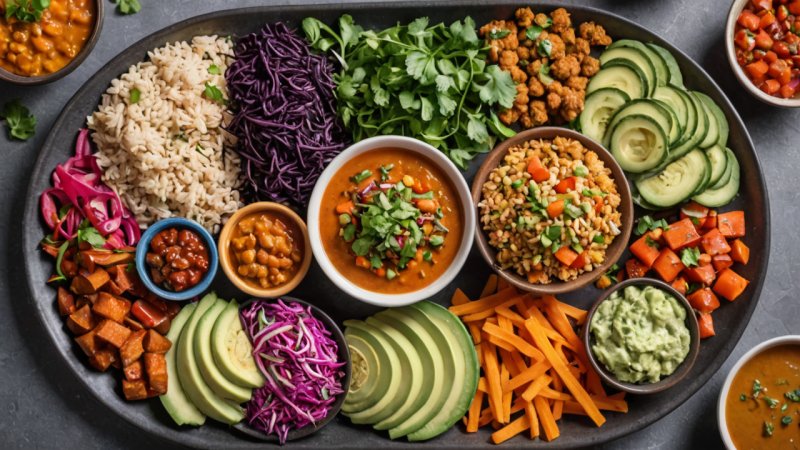The culinary world has seen a significant transformation in recent years, with vegan cuisine emerging as a prominent trend across the globe. As more people become aware of the health benefits, environmental impact, and ethical considerations of animal-based products, veganism has transcended its niche status to become a mainstream dietary choice. This article explores common questions surrounding this trend, shedding light on the rise of vegan cuisine worldwide.
What is vegan cuisine?
Vegan cuisine refers to dishes that do not contain any animal products, including meat, dairy, eggs, and honey. It emphasizes the use of plant-based ingredients, offering a variety of flavors and textures. From hearty stews to decadent desserts, vegan cooking aims to provide satisfying meals without compromising on taste.
Why is vegan cuisine becoming more popular?
The rise in popularity of vegan cuisine can be attributed to several factors:
- Health Benefits: Many studies suggest that a plant-based diet can reduce the risk of chronic diseases, including heart disease, diabetes, and obesity.
- Environmental Concerns: The environmental impact of animal farming is substantial, leading to increased interest in sustainable food practices.
- Ethical Considerations: Animal welfare issues have prompted many consumers to reconsider their dietary choices.
- Culinary Innovation: Chefs and home cooks are getting creative with plant-based ingredients, leading to delicious and innovative vegan dishes.
How does vegan cuisine differ in various cultures?
Vegan cuisine varies significantly from one culture to another, often influenced by local ingredients, culinary traditions, and historical practices. For example:
- Indian Cuisine: Rich in vegetarian options, Indian cuisine offers a plethora of vegan dishes, including lentil-based curries and vegetable biryanis.
- Middle Eastern Cuisine: Dishes like falafel, hummus, and tabbouleh are naturally vegan and widely enjoyed.
- Western Cuisine: There has been a surge in plant-based burger options and dairy-free desserts, reflecting a growing acceptance of veganism.
What are some common ingredients used in vegan cooking?
Vegan cooking utilizes a diverse array of ingredients, including:
- Legumes: Beans, lentils, and chickpeas are excellent protein sources.
- Grains: Quinoa, rice, and oats serve as hearty bases for meals.
- Nuts and Seeds: Almonds, chia seeds, and hemp seeds add texture and nutrition.
- Vegetables and Fruits: A wide variety of fresh produce forms the core of vegan dishes.
- Plant-Based Alternatives: Products like tofu, tempeh, and seitan provide meat-like textures.
Are there health benefits to adopting a vegan diet?
Yes, numerous studies have highlighted the potential health benefits of a vegan diet, including:
- Weight Management: Vegan diets are often lower in calories and high in fiber, which can aid in weight loss.
- Lower Cholesterol: A plant-based diet can help reduce cholesterol levels and improve heart health.
- Improved Digestion: The high fiber content in fruits, vegetables, and whole grains promotes healthy digestion.
- Increased Energy Levels: Many individuals report feeling more energetic on a plant-based diet.
What challenges do people face when transitioning to veganism?
Transitioning to a vegan diet can come with challenges, such as:
- Nutritional Deficiencies: It's crucial to ensure adequate intake of nutrients like vitamin B12, iron, and omega-3 fatty acids.
- Social Situations: Navigating meals at social gatherings can be tricky when dining out or attending events.
- Finding Alternatives: Some may struggle to find satisfying plant-based options, especially in certain regions.
How can travelers enjoy vegan cuisine while exploring new destinations?
Traveling as a vegan can be rewarding. Here are some tips:
- Research Local Cuisine: Before visiting a new destination, look up local vegan options and specialties.
- Use Apps: Utilize apps that help find vegan-friendly restaurants and dishes.
- Communicate: Don't hesitate to ask restaurant staff about vegan options or modifications.
- Cook Yourself: If possible, consider staying in accommodations with kitchen facilities to prepare your meals.
In conclusion, the rise of vegan cuisine is not just a fleeting trend but a reflection of changing consumer preferences worldwide. As more people embrace plant-based diets for health, ethical, and environmental reasons, the culinary landscape will continue to evolve, offering delicious and diverse options for everyone, regardless of dietary restrictions.






